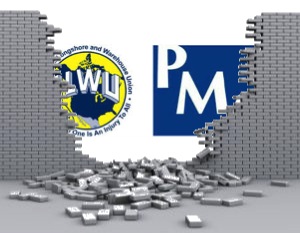UH-OH – ILWU Contract Negotiations Suspended Till June
Contract negotiations between the International Longshore & Warehouse Union (ILWU) and their employers at the West Coast ports, the Pacific Maritime Association (PMA), have been suspended until June 1st according to reporting by Bill Mongelluzzo in the Journal of Commerce (JOC).
Mongelluzzo reports the suspension of negotiations comes at the behest of the ILWU:
One source last week said little progress has been made since the talks began and that the ILWU, at this point, appears to be in no rush to secure a new contract prior to the July 1 expiration of the current deal.

This is a return to normal from the ILWU, who traditional do not like to negotiate, at least in any serious manner, before the previous contract has expired. In fact, it has been the policy of both the ILWU and the International Longshoremen’s Association (ILA) to never extend or agree to a new contract before the expiration of the previous contract. Waiting for the expiration of the contract opens up the dockworkers’ unions’ ability to slow operations at the ports, threaten strikes, and actually strike in order to gain leverage in negotiations.
However, during the last new contract cycle, things went exceptionally smoothly, with the dockworker unions on both sides of the country negotiating and agreeing to a new contract before either saw their previous contract expire.
That exceptionally smooth transition came off the heals of a particularly bad contract transition when contentious negotiations between the PMA and ILWU in 2014-15 led to agricultural exports rotting on docks, import goods never making it to the shelves for the holiday season, billions in losses to the U.S. economy, as well as international trade partnerships for U.S. businesses being permanently dissolved.
Many shippers are worried about a repeat of that situation. While particularly damaging, the 2014-15 negotiations were much closer to the norm than the smooth contract negotiations that followed.
The hope was the latter, smoother contract negotiations would become the new norm, that perhaps a corner had been turned.
While early contract agreement certainly does not appear to be the new norm, the Port of Los Angeles’s director is trying to keep concerned parties calm and optimistic that we’re not returning to the old and damaging modus operandi. Mongelluzzo reports:
Gene Seroka, executive director of the Port of Los Angeles, told a Draytech seminar Friday in Long Beach that industry stakeholders should not rush to conclusions because of a temporary halt in the negotiations.
“Both sides have seasoned negotiators. There’s a lot on the table,” Seroka said. “Give them some space.”
Certainly, calling this suspension a breakdown of negotiations would be jumping to conclusions. However, it does not give reason for optimism. With the PMA deferring queries to the ILWU and the ILWU refusing to comment, shippers and other stakeholders have little reason to feel optimistic. Whenever it’s time for a new contract to be negotiated with one of the dockworker unions, it tends to be costly for shippers.
Mongelluzzo did report that individual committee meetings between the PMA and ILWU are continuing despite the suspension. The source he got that from said those committees are working on issues such as worker safety.
Of course, worker safety isn’t an issue that is likely to be a sticking point. Obviously, both parties care about the safety of the dockworkers. There could be differences in how the ILWU and PMA want to approach the issue, but there isn’t a fundamental conflict on the issue. There is, however, a fundamental conflict the parties have on the issue of automation.
The PMA sees automation, and rightfully so, as a necessity for the ports to be competitive and efficient in the moving of goods. The ILWU sees automation as an existential threat. Automation does mean having machines do work “automatically” which would have previously been performed by people. So there’s reason for the ILWU to have fear around the issue too.
We previously covered in this blog how this fight went public before the negotiations even started with the PMA releasing a study showing automation created jobs at the ports and the ILWU calling it a “shell game.”
Really, the fight has been raging for years. While the ports have made some progress in the area of automation, the ILWU (and the ILA on the East and Gulf Coasts) has greatly slowed the advancement of automation at the ports. So much so, in fact, that U.S. ports are much less efficient than many of their counterparts around the world.
When lockdowns and stimuli produced months upon months of surging demand of import goods at the ports, the lack of automation and efficiency was one of the large factors in creating the terrible congestion and bottlenecks suffered at the ports.
One piece of good news about the suspension is that it is scheduled to end, with negotiations planned to resume, a month before the July 1st expiration of the ILWU contract. That does give some time for progress to be made before the current contract expires. But I don’t think these negotiations started early enough to begin with to have any realistic chance of producing a new contract before the expiration of the old. And I don’t think the ILWU ever had any intention of completing negotiations before contract expiration would increase their negotiation leverage.




